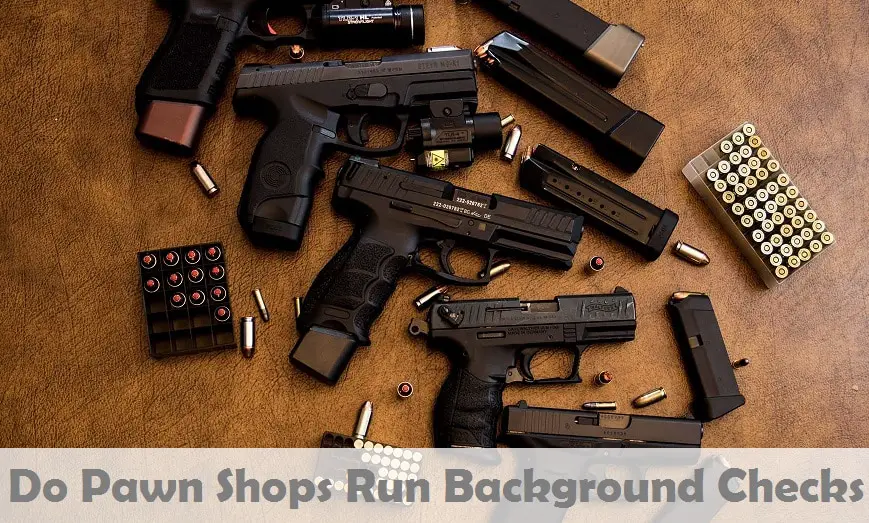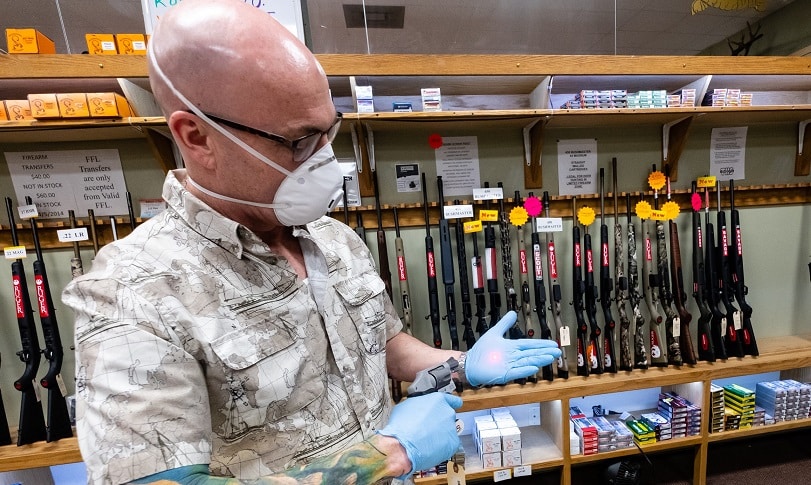Throughout the United States of America, pawn shops are required to perform background checks for purchasing or claiming back firearms. This is a multiple-stage check, but can usually be completed in a number of minutes. We will explore what happens during a pawn shop background check, reasons why an individual may fail the check, and what an individual can do to best improve their chances of passing.
What is included in the pawn shop gun background check?

A pawn shop background check is very similar to one that would be performed by any potential employer and, at very least, would examine these 4 main sections:
- Credit reports
- Driving records
- Educational records
- Criminal offenses
Pawn shops have had at times less than stellar reputations and, in an effort to clean up their image, full background checks are now run in order to ensure that a pawn shop is not selling things (but especially weapons) to those who are dishonest or have a serious criminal background.
The criminal offenses section of the background check is what is of most interest to those who are running it and it will examine your criminal history files which include any criminal offenses. Outside of the reputation of the pawn shop, this also helps local institutions such as firing ranges to make appropriate risk assessments and consider potential security risks in the local area. It is important to know that this does not just include current convictions, but also any arrests, non-convictions, and any other non-expunged criminal history file.
When does a pawn shop perform a background check?

It is important to consider when and why a pawn shop would perform a background check; a pawn shop by definition offers loans based on collateral – that is, anything which they consider to be of particular worth to them – that are usually intended to be repaid over a short time period such as between a month and half a year.
If the loan is not repaid, then the pawnbroker claims whatever was offered as collateral and can sell the item on as they wish. Most, if not all, pawn shops must adhere to federal laws when they are dealing with firearms, including the Patriot Act, and are regulated by the Bureau of Alcohol, Tobacco, Firearms, and Explosives (ATF) in the same way that a specialized seller of arms is.
A pawn shop does not need to perform a background check to pawning firearms – that is, if a person is selling a firearm to the pawn shop – but will generally at very least require the individual to show a valid state-issued identification card.
This is not always the case and, depending on state requirements or even requirements set by the shop itself, individuals may have to offer fingerprints, a photograph, or another form of identification in order to successfully pawn a firearm. This information will be shared with the appropriate authorities should there be concerns about stolen goods or dangerous individuals. If a person is wanting to acquire a firearm, however, the check will begin.
What happens during a check?
As previously stated, almost all pawn shops are regulated by the ATF and subjected to laws such as the Patriot Act. This means they have tight restrictions and policies concerning the selling and buying of firearms. The buying individual must have at very least three things in order to purchase or reclaim a firearm: a valid state-issued identification card, a permit to buy or carry a gun, and the appropriate form, usually a firearms transaction record. The form will be incredibly important as lying on this form can lead to prison time of up to 10 years and hefty fines of up to $250,00.
What must be on a Firearms Transaction Record Form?
The Firearms Transaction Record Form (also called the ATF 4473 form) is a 16 question form that requires a potential buyer to disclose a number of factors about themself. The form must disclose your criminal history, any history of drug use (past or present), military service citizenship, domestic violence convictions, open warrants, and mental deficiencies.
These are all assessed in an effort to ensure that those who are purchasing firearms are in a fit state of mind and can be trusted to possess and use the firearm legally and properly. It is of the utmost importance not to lie or attempt to conceal anything that this form requires as it is a serious crime to do so.
What must the pawn shop fill out?
A pawn shop will have to fill in a form concerning the firearm that is being sold, maintaining a record of the type of firearm, model, caliber, serial number, and the buyer’s identification provided at the time of purchase. This information is then checked against the National Instant Criminal System (NICS) to carry out the actual criminal background check, which is designed to compare the buyer’s full name and birth year with a list of individuals who are ineligible to buy a firearm.
This can take a matter of minutes, but it can be delayed for a number of perfectly innocent reasons that require the buyer to wait for a number of days. There are three possible outcomes from this check:
Proceed – the firearm can be purchased immediately and the transaction is over. This will be the expected result for most citizens and should make the process fairly simple and straightforward.
Delayed – the firearm can potentially be purchased, but a more in-depth background check must be performed. It is possible that there is no legitimate reason why an individual would be refused the firearm, but common problems can include: having an extremely common name, meaning that the system is unsure if you are trustworthy enough or have any criminal convictions; having security clearance in the military, although this is not generally an issue; if the social security number is similar to that of a convicted felon; and if there are unpaid speeding or parking tickets.
This by no means an exhaustive list, but are a few examples of reasons why an individual may receive a delayed message. In this case, the individual will have to simply wait the appropriate waiting time (usually up to 3 days).
Denied – the firearm cannot be purchased at this time by this individual. This is likely to be caused by a felony conviction or any other conviction concerning violence such as domestic violence. Without a good reason, the individual will be denied purchasing a firearm at all.
In the case of a denied result, the pawnbroker must also inform local law enforcement within 48 hours – if you are in a situation where you are not allowed to purchase a firearm (e.g. a felon without special permissions granted to them), it is important that you consider that the attempted purchase will be reported to the police.
This background check can be self-run before applying to purchase a firearm from a pawnbroker, but it is wise to contact an attorney beforehand especially if you have felony convictions against your name.
General restrictions
Outside of the general background check requirements for felonies and domestic violence charges, a buyer may also be refused due to a number of other reasons. The most obvious one is age – a buyer cannot purchase any firearm unless they are 18 and they must be 21 in order to purchase a handgun.
They can also not have a criminal record which broadly shows a history of violent crime, especially including convictions relating to drug and gang-related crimes or any other criminal activity within the past 3 years.
Buyers cannot be fugitives, illegal aliens, or dishonorably discharged from the military.
Improving your chances as a felon
The most straightforward and likely successful way to improve your chances of passing a background check would be to attempt to expunge the criminal charge from your criminal record.
There are multiple factors that would affect the chances of success in expunging a criminal conviction, but generally considered the length of time since the crime, efforts made by the guilty party to improve themselves since the time of the crime, and whether firearm rights have been restored in general.
The best course of action for a felon is to search for legal aid and search for a federal pardon or other special recommendation by a state representative.
